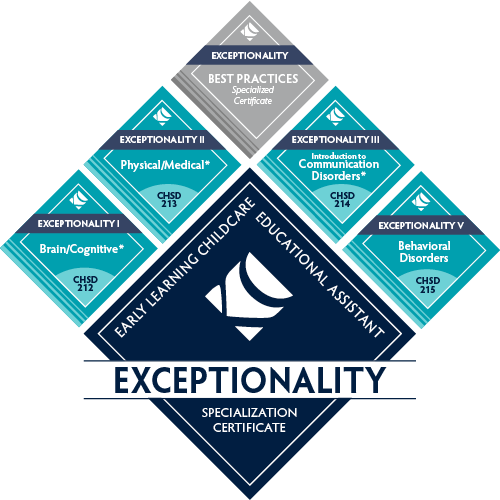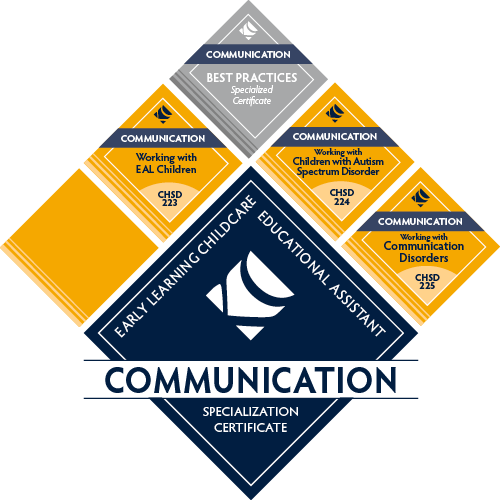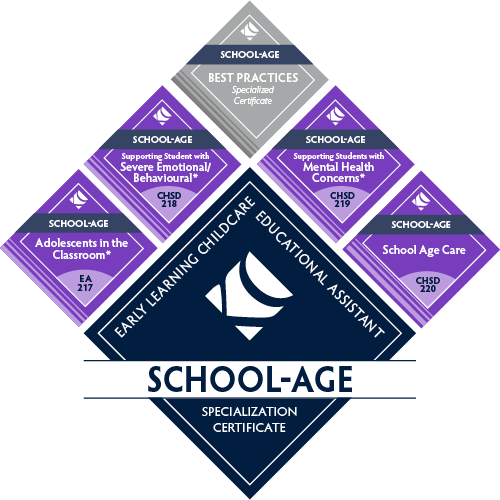


Click the badges above to learn more about our Micro Credential courses.
Admission Requirements Program Structure Tuition and Fees Current Course Offerings
Childhood Studies at Keyano College is now offering Micro Credentials for graduates of Early Learning and Child Care (ELCC) Certificate. This program allows students to progress at their own pace completing one or more course per year.
Program Structure
 Exceptionality Specialization Badge Exceptionality Specialization Badge |
|
Students who complete three Exceptionality Specialization courses can receive the Exceptionality Specialization badge.
Exceptionality Specialization Courses
|
Code
|
Course Name
|
Course Description
|
|---|
|
CHSD212
|
Exceptionality I Brain/Cognitive
|
This course examines the theoretical and educational concepts associated with students with exceptionalities in Alberta to include the following: Specific Learning Disabilities (SLP), Attention-Deficit/Hyperactivity Disorder (AD/HD), Fetal Alcohol Spectrum Disorder (FASD), Developmental Delays (DD), Global Developmental Delay (GDD), Intellectual Disabilities (IDD), Auditory Processing Deficit (APD), and Sensory Integration Dysfunction. The role of the special needs educational assistant is considered in the context of programming and serving students based on educational needs rather than a clinical label. As such, aspects such as accommodations, strategies, physical changes to the environment, and the use of assistive technology are considered essential elements of the Educational Assistant's toolbox to adapt learning activities and materials for students with a range of academic, emotional and physical challenges.
|
|
CHSD213
|
Exceptionality II Physical/Medical
|
This course will provide students with a practical overview of children's special health care needs they may encounter in the education field. We will explore diabetes, cystic fibrosis, cerebral palsy, asthma, seizure disorders, spina bifida, and allergies. Knowledge of the exceptionality and strategies for working with children who have physical and/or medical needs will be included.
|
|
CHSD214
|
Exceptionality III Introduction to Communication Disorders
|
Working one-to-one with children to improve their oral expressive skills and articulation is a frequent job requirement for educational assistants. Implementing programs prescribed by speech-language pathologists requires a deep knowledge of language and speech development. Issues and techniques involved in teaching children with communication disorders will be examined.
|
|
CHSD215
|
Exceptionality V Behavioural Disorders
|
A variety of teaching techniques and strategies for working with children with behavioural disorders will be explored.
|
|
 Communication Specialization Badge Communication Specialization Badge |
Students who complete three Communication Specialization courses can receive the Communication Specialization Badge.
Communication Specialization Courses
| Code | Course Name | Description |
|---|
| CHSD223 |
Working with EAL Children |
This course is a resource of ideas and approaches for use with ESL children as they learn English. It offers sound, practical techniques and approaches in all four language skill areas, listening, speaking, reading, and writing. |
| CHSD224 |
Working with Children with Autism Spectrum Disorder |
This course will enable the student to develop the understanding and skills to effectively support children with Autism Spectrum Disorders (ASD). It emphasizes best practices in social skills development, behaviour management, and sensory integration therapy and communications systems for assisting children with ASD in inclusive programs. |
| CHSD225 |
Working with Communication Disorders |
Working one-on-one with children to improve their communication skills is a frequent job requirement for educational assistants. Educational Assistants are required to understand a variety of treatment approaches for various communication disorders to appropriately implement programs developed by a Speech-Language Pathologist. Issues and techniques involved in teaching children with communication disorders will be discussed. |
|
 School-Age Specialization Badge School-Age Specialization Badge |
Students who complete three School-Age Specialization courses can receive the School-Age Specialization Badge.
School-Age Specialization Courses
| Code | Course Name | Description |
|---|
| EA217 |
Adolescents in the Classroom |
This course will enable the student to develop a greater knowledge of the unique needs of adolescents by examining adolescent development. It will provide the educational assistant with a repertoire of strategies and interventions to effectively support adolescents and their junior/senior high teachers. The goal will be to meet the academic, social and behavioural needs of the adolescent. |
| CHSD218 |
Supporting Students with Severe Emotional/Behavioral |
This course explores various ways to support students with severe emotional/ behavioral challenges in the classroom. Techniques that foster positive behaviour change and strategies that prevent challenging behaviour will be applied through the creation of behaviour support and crisis management plans. |
| CHSD219 |
Supporting Students with Mental Health Concerns |
This course further examines the characteristics, signs and symptoms of the most common mental health concerns facing adolescent students. There will be an emphasis on exploring the stigma of mental illness and examining appropriate strategies to support students. |
| CHSD220 |
School-Age Care |
This course will provide a brief overview of developmentally appropriate programs for children aged five to twelve outside of their formal school days. We will examine developmental milestones of school-age children, the roles their caregivers play to support their development, optimum school-age care environments, building community, and developmentally appropriate curriculum in school-age care settings. |
| CHSD226 |
Fostering Diverse Learning Environments |
An introduction to Diversity, Equity, and Inclusion (DE&I) in the classroom. This foundational course expands thinking while promoting the importance of continuous learning in the DE&I space. The importance of learning from and with children and families to create a safe and diverse learning environment is explored. Incorporated in this course is a rudimentary history of residential schools in Canada and the principles of Truth and Reconciliation to promote inclusive learning environments. |
|
| Childhood Studies Best Practice Badge |
| The Childhood Studies Best Practice Badge is offered when students choose one course from each colour-coded specialization section. |
Admission Requirements
To qualify for the Childhood Studies Micro-Credential program you must have one of the following:
- An employed Educational Assistant/ELCC in the field for 2 years or more.
- An employed EA/ELCC person who has previously worked in the childcare or school setting and can prove they have worked for two years of more with children. For PLAR consideration, applicants must be submitted must submit a completed PLAR form to the Office of the Registrar. PLAR (Prior Learning Assessment Recognition) provides a way of recognizing learning which has taken place on the job, in employment-based training, or in a variety of experiences outside of the workplace.
- The ELCC students who have finished the ELCC certificate program in April 2022 and wish to continue their studies with three micro credential courses
- EA students who wish to obtain a specialization micro credential badge
For more information on how to get started please contact the Chair of Human Services.
Current Course Offerings
| Spring 2022 Course Offerings - May 9 - June 17, 2022 |
Each course takes place online over the course of five weeks. Classes are 3 hours long with synchronous (time: 6:30 p.m. - 9:30 p.m.) and asynchronous (on the student's own time).
Courses
| Code | Course Title | Description |
|---|
| CHSD212 |
Exceptionality I Brain/Cognitive |
This course examines the theoretical and educational concepts associated with students with exceptionalities in Alberta to include the following: Specific Learning Disabilities (SLP), Attention-Deficit/Hyperactivity Disorder (AD/HD), Fetal Alcohol Spectrum Disorder (FASD), Developmental Delays (DD), Global Developmental Delay (GDD), Intellectual Disabilities (IDD), Auditory Processing Deficit (APD), and Sensory Integration Dysfunction. The role of the special needs educational assistant is considered in the context of programming and serving students based on educational needs rather than a clinical label. As such, aspects such as accommodations, strategies, physical changes to the environment, and the use of assistive technology are considered essential elements of the Educational Assistant's toolbox to adapt learning activities and materials for students with a range of academic, emotional and physical challenges. |
| CHSD213 |
Exceptionality II Physical/Medical |
This course will provide students with a practical overview of children's special health care needs they may encounter in the education field. We will explore diabetes, cystic fibrosis, cerebral palsy, asthma, seizure disorders, spina bifida, and allergies. Knowledge of the exceptionality and strategies for working with children who have physical and/or medical needs will be included. |
| CHSD214 |
Exceptionality III Introduction to Communication Disorders |
Working one-to-one with children to improve their oral expressive skills and articulation is a frequent job requirement for educational assistants. Implementing programs prescribed by speech-language pathologists requires a deep knowledge of language and speech development. Issues and techniques involved in teaching children with communication disorders will be examined. |
| CHSD218 |
School-Age
Supporting Students with Severe Emotional/Behavioral
|
This course explores various ways to support students with severe emotional/ behavioral challenges in the classroom. Techniques that foster positive behaviour change and strategies that prevent challenging behaviour will be applied through the creation of behaviour support and crisis management plans. |
| CHSD219 |
School-Age
Supporting Students with Mental Health Concerns
|
This course further examines the characteristics, signs and symptoms of the most common mental health concerns facing adolescent students. There will be an emphasis on exploring the stigma of mental illness and examining appropriate strategies to support students. |
| EA217 |
School-Age
Adolescents in the Classroom
|
This course will enable the student to develop a greater knowledge of the unique needs of adolescents by examining adolescent development. It will provide the educational assistant with a repertoire of strategies and interventions to effectively support adolescents and their junior/senior high teachers. The goal will be to meet the academic, social and behavioural needs of the adolescent. |
|
Tuition and Fees
| Spring Semester 2022 Fees |
Domestic Tuition & Fees for Spring Semester
| Program | Per Credit | SA Fee | SA Building Fee | Campus Recreation Fee | Tech Fee |
|---|
| Early Learning and Childcare |
$149.00 |
$21.00 |
$3.36 |
$55.00 |
$75.00 |
| Educational Assistant |
$159.00 |
$21.00 |
$3.36 |
$55.00 |
$75.00 |
|
| International Student Spring Semester 2022 fees |
International Student Tuition & Fees for Spring Semester
| Program | Per Credit | SA Fee | SA Building Fee | Campus Recreation Fee | Tech Fee |
|---|
| Early Learning and Childcare |
$447.00 |
$21.00 |
$3.36 |
$55.00 |
$75.00 |
| Educational Assistant |
$477.00 |
$21.00 |
$3.36 |
$55.00 |
$75.00
|
|
Please note, these estimates are based on 100% enrollment for all semesters.
* Students will be charged a medical/dental benefit fee unless they opt out by demonstrating alternative coverage - deadlines can be found at StudentCare website.
** These programs have a mandatory Spring semester if students intend to graduate on time.
*** Tuition is due 10 business days before the start of each semester.
For more information view the Keyano College Credit Calendar.








